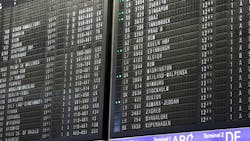European and American regulators pledge cooperation in addressing future aviation challenges
WASHINGTON - The Federal Aviation Administration (FAA) and European Union Aviation Safety Agency (EASA) announced the regulators will work together to meet the challenges of a fast-changing and evolving aviation industry and the increasing speed of development of future technologies. Leaders from the FAA and EASA discussed the renewed commitment at the 2024 International Aviation Safety Conference in June.
“Our aim is to promote a cooperative and collective approach to aviation safety and modernization,” said FAA Administrator Mike Whitaker. “As we look to the next decade, establishing a unified strategic direction based on information sharing and collaboration with our international partners will meet the needs of our global aviation system of the future.”
“The aviation industry is in the fastest period of change since commercial flights began. New technologies are urgently needed to make the industry more sustainable. Other innovations, for example in artificial intelligence, are emerging rapidly and we have a generational change in the workforce,” said Florian Guillermet, Executive Director of EASA. “It is more important than ever that international aviation regulators work together to accompany the changes and ensure safety needs are always met.”
Related: Lilium receives EASA design organization approval for electric air taxi
Discussions in plenary sessions and side meetings at the three-day conference, centered around the theme “Building foundations: Preparing for the next decade together,” underscored the importance of strong collaboration between regulators to keep pace with the rapid evolution in aviation. The FAA and EASA have pledged to enhance cooperative efforts at all working levels between their organizations, emphasizing the exchange of information on safety oversight to promote a strong safety culture.
They aim to optimize resources and fully leverage the US-EU Aviation Safety Agreement, encouraging their technical experts to work together and rely on one another to reduce duplication of efforts through a risk-based approach. Proactive collaboration on certification activities and operational frameworks for new and innovative technologies will be deepened, while cooperation on rulemaking efforts will be expanded and targeted earlier in the development process.
Furthermore, the FAA and EASA will promote aviation sustainability, particularly focusing on sustainable aviation fuel development and deployment. They will partner to ensure the goals of the Bilateral Enhancement Roadmap on certification activities are realized, reinforcing cooperation on the analysis and mitigation of systemic safety risks as well as innovation and future aviation technologies. The exchange and sharing of information on emerging risks facing aviation safety, such as cyber threats, conflict zones, and GPS/GNSS interference, will also be facilitated.
